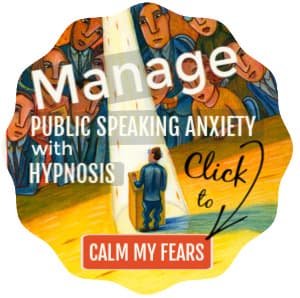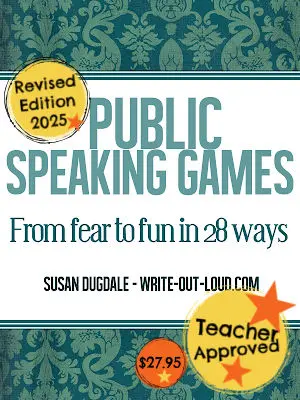- HOME ›
- Speech delivery ›
- Speech evaluation
Speech evaluation: getting good feedback
How to get (and give) useful speech feedback, plus a printable public speaking evaluation form
By: Susan Dugdale
Did you know receiving an informed speech evaluation is an invaluable part of developing public speaking competence and confidence?
It might seem scary to ask for, and then to receive, specific suggestions and comments about what you've done. But how else do you learn what part of your presentation worked and what aspects need further refinement?
If you want to move forward, to improve your public speaking skills, receiving, and giving, good feedback is vital.
Use this page to find out more
If you want informative feedback and you're not a member of a public speaking club, this page is for you.
You'll find out how a speech is formally assessed:
- the aspects/areas focused on in an evaluation,
- the 5-point sliding scale used to rate performance,
- how to get a meaningful speech evaluation,
- how to use an evaluation to improve your performance
- and there's a printable public speaking evaluation form to download.
What is a good speech evaluation?
And how do you get one?
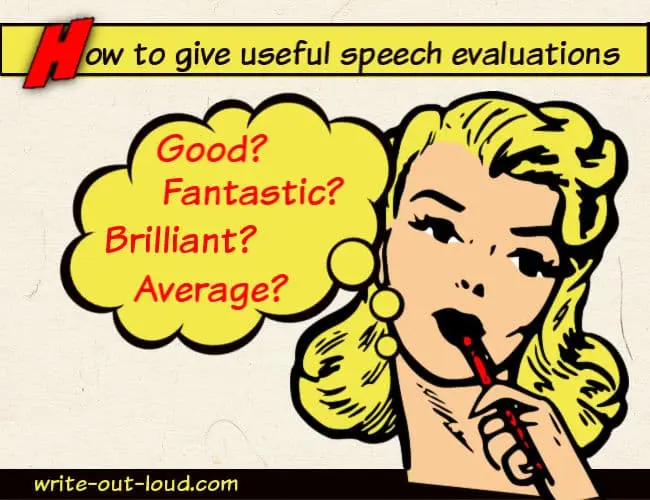
Unfortunately, there are few situations outside of specialist public speaking programs, like those in schools, or clubs like Toastmasters International, where you can get (or give) a thorough and useful speech evaluation.
Despite the ability to present well being recognized as a desirable skill it's seldom encouraged with careful, thoughtful feedback.
Often the most you can hope for is a generalized "It was OK.", "Great! You were amazing!", or the dreaded: "Mmm. Perhaps we'll give someone else a turn next time." type of comment.
Nice or nasty, they don't tell you anything useful.
For feedback to be genuinely useful it needs to be specific and linked to what you were doing as you delivered your speech.
A thorough evaluation covers multiple elements from two broad areas: content (what you say) and delivery (how you deliver what you say).
Do you teach public speaking?
Here's five effective student-to-student activities (with printables) to encourage constructive, honest and respectful feedback.* Use them to build their self-confidence as well as their skills.
(The link is to an article from my Substack newsletter, Speaking Out Loud.)

What is rated in a speech evaluation?
The areas most commonly focused on are:
The speech introduction
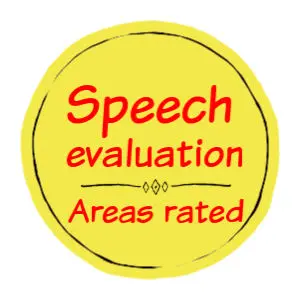
- Did it capture the audience's attention & interest?
- Was the topic introduced clearly?
- Was the topic related to the audience? Was it something of benefit to them that they would want to know about?
- Did the speaker have topic-credibility?
- Was the body of the speech previewed?
The body or main part of the speech
- Were the main points clear?
- Were they supported with examples and if necessary, backed with credible references?
- Were they logically presented?
- Were the transitions between them clear & effective?
The speech conclusion
- Was the transition to the end of the speech signaled?
- Was there a summary of the principal points made in the body of the speech?
- Was there an effective close and/or call to action?
The language or vocabulary used
- Was the language used appropriate for the topic and the audience?
- Was it varied to sustain interest?
The speech delivery
Speech delivery is not about the content of the speech but about HOW the content was presented. Was it presented effectively? In all areas? Where could it be improved?
- Were the notes, visual aids etc. organized before the start?
- Was the beginning poised?
- Was there good use of eye contact?
- Was the body language (posture and gesture) controlled & effective?
- Was the speaking rate flexible and effective?
- Was the speaking volume appropriate and varied?
- Was there fluency, an absence of fillers like 'ahs' and 'ums'?
- Was vocal variety used, changes in pitch and tone, and good use of pausing?
- Did the speaker show genuine enthusiasm for the topic?
- Were there visual aids? Were they appropriate and smoothly integrated into the flow of the speech?
- Did the speech finish well?
The overall speech evaluation
- Did the speaker achieve the assignment's purpose? For instance, if the speaker was asked to give a speech persuading their audience to give to a local charity, was there a rush of contribution pledges at its close?
- Was the topic researched? Did you feel the speaker knew what they were talking about? Had they done their homework?
- Did the topic adapt well to the audience? How had the speaker shaped their speech to meet the needs of their audience?
- Were the audience interested? How did they show it?
- Was the speech completed within the time limit?
How are these areas/aspects rated?
In a formal speech evaluation, such as one done by a teacher in a high school public speaking class, variations on a sliding scale are used.
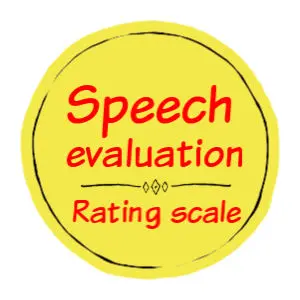
The most common is a 5 point scale:
- P (poor)
- F (fair)
- A (average)
- G (good)
- E (excellent)
You can see this scale in use on the downloadable printable public speaking evaluation form available from the link at the foot of the page.
The person doing the rating will actively listen and watch the speech evaluating each element.
The final assessment will generally show a range (up and down the scale) over most of the aspects. Therefore, a speech can be seen to be 'good' in some areas, 'excellent' in others and perhaps 'fair' in one or two.
Getting a thorough speech evaluation
If you're not in a public speaking class or a member of an organization like Toastmasters International and the people you work with don't provide criteria-based feedback you have two options.
They are:
- find a class or a Toastmasters group in your area.
- organize your own feedback givers using the information outlined above with the suggestions below.
Organizing you own speech evaluators
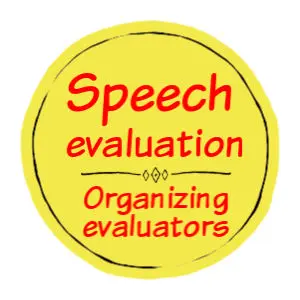
- Ask a person whose judgement and maturity you respect whether they'll accept the role, and be present at your next speech or presentation. Perhaps you can team up with them and trade evaluations taking turn about.
- Download and print off several copies of the speech evaluation form.
- Go through the form with your evaluator explaining the process. Highlight any areas you particularly want noticed.
- Establish how you want the rating scale interpreted. A good way to set the benchmark is to listen to an excellent speaker. You could choose one from here: The Top 100 American Speeches.
- Have your evaluator listen to your speech and provide feedback before you give it in front of an audience. This will provide a foundation for their comments when they complete your speech evaluation 'proper'.
Working with your speech evaluation
You've got your evaluation. Now what do you with it?
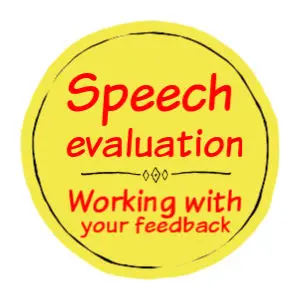
Go through it with your evaluator. Bear in mind before you do:
- that an evaluation is an opinion.
At best it is an informed one with knowledge and experience behind it.
If you find areas you disagree with, do try and understand them from the evaluator's point of view.
Often what we think we do and what we actually do are two completely different things. - that a poor or fair rating represents an opportunity to develop rather than a reason to give up public speaking.
Use the ratings as a guide on where to focus your energy.
For example, if you're rated well on the delivery items but have fallen on the content, (introduction, body, conclusion), you know that for your next speech you'll spend the bulk of your preparation time organizing your content.
Keep your completed speech evaluation forms. It's great to be able to refer back to them to see how far you've come and it's interesting to compare how different evaluators pick up on different aspects to comment on.
Toastmasters International
For more information on the importance of evaluations and the role they play in improving public speaking skills visit Toastmasters International - Effective Evaluation.
I got my first really helpful feedback once I joined Toastmasters. It didn't happen as part of my teacher training, which is extraordinary given that teaching IS presentation.
Neither was it part of other workplaces I got to know.
Good presentation skills are not innate. Like other skills they need to be learned. Giving and receiving evaluations will speed your progress.
Download a printable speech evaluation form
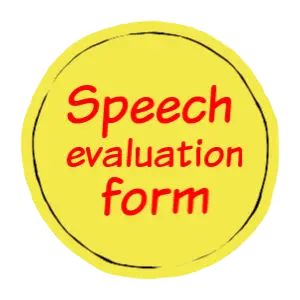
It's simple to use and suitable for:
- students wanting to know more about the assessment criteria for their prepared speeches
- teachers
- anybody wanting structured feedback on their public speaking.
The form lists all the important elements that collectively make a successful speech alongside a 5-point rating scale.
Download the speech evaluation form
Do you want to know more about planning, writing and rehearsing speeches?
- Here's a sample speech outline page. It has a handy downloadable blank speech outline form ready and waiting for your notes.
- You'll find more about planning your speech here.
This page takes you through the sequence of planning decisions and shows you how they are guided by knowledge of your audience. - When you've done all your planning you can find out about how to write your speech
- And then it's fun time. Find out how to rehearse. Yes, practice does make perfect!

About the Author: Susan Dugdale, founder of write-out-loud.com, is a qualified teacher of English and drama with over 40 years of experience. Drawing on her professional expertise and her personal journey from shyness to confidence, Susan creates practical, real-world resources to help people find their voice and speak with power.

